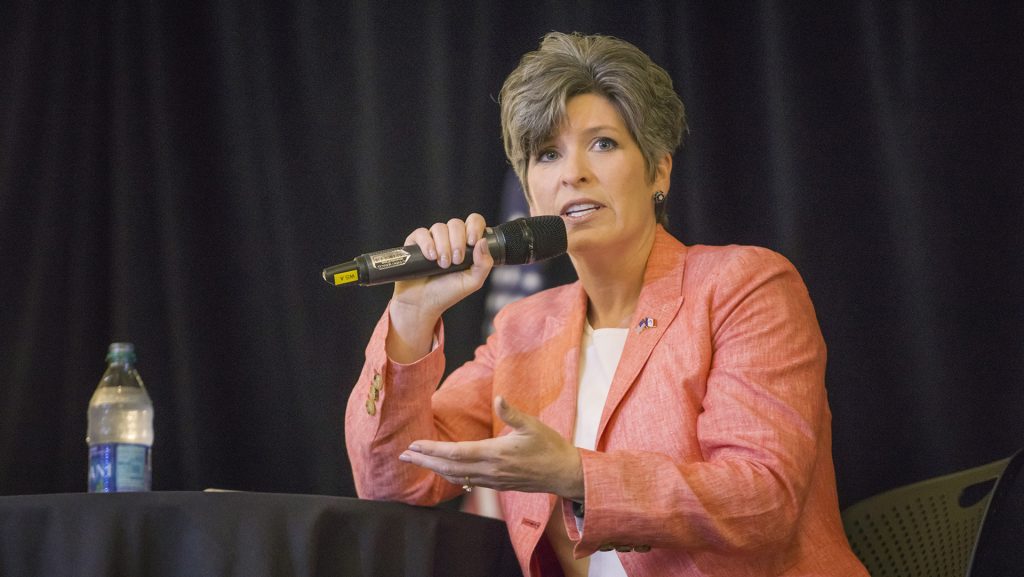Neal: Women in Washington: Could empowerment lead to bipartisanship?
Women supporting other women is a pretty well-supported idea, and for great reason. Female empowerment is seemingly increasing in Washington, and it might just help centralize the left and right.
Sen. Joni Ernst, R-Iowa, responds to questions from the crowd at a Town Hall meeting in the Iowa Memorial Union on Friday, Sept. 22, 2017.
February 18, 2019
With figures such as Amy Klobuchar, Elizabeth Warren, Kamala Harris, Tulsi Gabbard, and Kirsten Gillibrand in the running for the presidency, I wouldn’t be surprised if we saw some glass ceilings shattering in 2020.
Those are some pretty big names — all of them have congressional experience.
This made me wonder — how will the good-ol’ political-campaign-passive-aggression play out with so many strong, powerful congresswomen on the same side of the aisle? Will they still support one another … even as competitors?
All I knew was that there would be some serious girl power going down.
But Sen. Warren seemingly thought the same thing and pretty much answered my question in her response to a New York Times tweet acknowledging the women running for the White House.
“Running for President: That’s what girls do,” Warren tweeted Feb. 12.
Obviously, I loved this. Women supporting women — how could I possibly be anything BUT ecstatic? But I started to think about the women across the aisle — most of whom I disagree with on like … a lot of things, but still, who are also doing their fair share to shatter glass ceilings.
But the assumption that women on the left don’t support women on the right, and vise versa, is just another falsehood swirling around to do nothing but generate an even greater partisan divide.
How can I be so sure?
Well, when President Donald Trump acknowledged the record-breaking number of women in Congress during his Feb. 5 State of the Union address, bipartisanship celebration was booming, including the support of freshman class members, who are not just the most female group of representatives, but also the most racially diverse.
RELATED: Women, politics, and change
Could womanhood, and the mere concept of women supporting other women, help centralize such a divided system?
One things clear, we’ve seen our share of female “fierceness” in Iowa. Of course with the installing of, and later election of Republican Gov. Kim Reynolds, but also at the national level, with Republican Sen. Joni Ernst.
In a December 2018 “Women Rule” summit hosted in Washington, Ernst spoke about the fierceness women uphold in the political arena — she emphasized the importance of encouraging women to step forward, which, she said, sometimes means challenging powerful men who had been leaders before.
“That’s OK, folks,” Ernst said at the summit. “We have got to be a little more aggressive about what we do. If we want our voices heard, then we have to decide we’re going to engage.”
Obviously, these are only a few of many instances I could explain to more effectively illustrate the surge of female power encapsulating Washington, and better yet, our nation. But these few are important to acknowledge nonetheless.
Like I’ve said before, I have my political biases — I disagree with many strong, female leaders, but that doesn’t mean I don’t recognize their strength and intelligence.
And this is the energy I am starting to see, and I hope I continue seeing, in female politicians — the ability to see beyond the red or blue party logos; the ability to lift one another up in a system that so heavily tries to weigh us down by bashing our femininity.
THIS is our future, and let me tell you, it’s bright. And it’s female.
RELATED: Fourth Wave Feminism and its political implications






